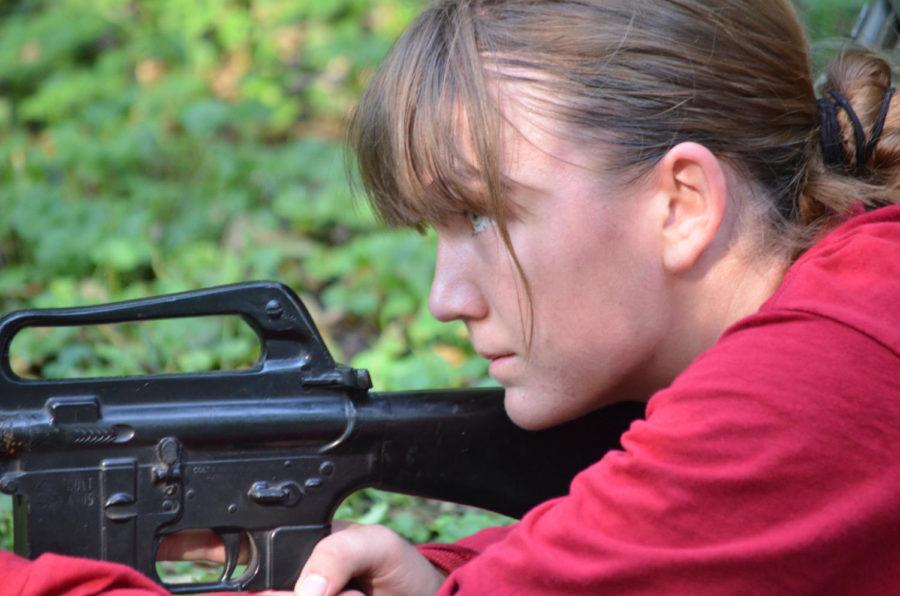Beiwel: Women should be allowed in combat
Katy Klopfenstein/Iowa State Daily
One of five Army ROTC platoons who met for a team building exercise. They worked on team building exercises in Brookside Park on Sep. 16. Cadets take cover in the brush for training.
January 12, 2016
Brothers-in-arms.
The phrase is deep in meaning. It’s drenched in history and carries years upon years of young men going to fight and die for their country in places they may not have even heard of before they boarded the plane.
Soldiers are among the bravest and most admirable people imaginable, and no amount of double talking or quantification can negate that.
But why brothers in arms alone? What about the women?
Lt. Shaye Haver and Capt. Kristen Griest became the first women to graduate the elusive Ranger School in August 2015. While they completed the necessary requirements and completed the school, neither Haver nor Griest are able to join the Ranger Regiment. They trained as hard as their male counterparts and worked as diligently, but they were barred from doing the same work based solely on the fact that they are women.
While women have made great strides in the military and occupy various indispensable positions, they are still considered less competent for some jobs because of the supposition that they are either not up to the physical demands of the job or are simply too fragile mentally to comprehend and deal with the horrors of what they would be asked to do.
I have heard time and time again that women should not be on the front lines in combat because, “What will happen if they’re captured? What horrors will they be subjected to?”
This only questions whether women would be able to withstand the possibility of torture or rape. Men, too, can be both tortured and raped, and nobody has ever questioned whether they can serve on the front lines.
A mandate was passed in September that stated that all combat positions need to be open to women. This was a landmark decision that demonstrated, as backwards and archaic as the world can seem sometimes, opinions are changing and old stereotypes are being challenged.
However, several branches of the military have asked to be exempt from the mandate on the basis that women will not be able to achieve in their branch.
Why don’t we let them try and put in the same effort as the men and see if they can pass? If they fail, so be it. But what if they succeed? Even better and monumental changes would be made. But don’t bar an entire gender from trying simply because it seems women can’t. If the standards for excellence are the same between men and women, and both pass, why can’t they both be allowed to perform?
Admiral Jon Greenert said that,”… We’re on a track to say, ‘Hey look, anybody who can meet the gender non-specific standards, then you can become a SEAL.'”
This perfectly encapsulates the need for non-biased standards that must be achieved by the people who are hoping to gain a position and the need to honor that achievement.
Another argument is that women will disrupt the brotherhood and camaraderie among soldiers, perhaps insisting that all women cause drama or that there cannot be any male-female relationships without the inclusion of sexuality.
This paints a simplistic view of the friendships that can grow between men and women. This is also insulting to men because it assumes they are guided only by their sexuality and cannot see a women as an equal, which is certainly untrue of most men. I’m not sure if there is a more outdated idea.
The military should be like any other occupation — open to both women and men. Women can be brave, strong and defend their country. Selflessness and strength are gender-neutral traits, and if women can do it, then let them.







